
|
||||||||||||||||||||||||||||||||||||||||||||||||||||||||||||||||||||||||||||||||||||||||||||||||||||||||||||||||||||||||||||||||||||||||||||||||||||||
|
| ||||||||||||||||||||||||||||||||||||||||||||||||||||||||||||||||||||||||||||||||||||||||||||||||||||||||||||||||||||||||||||||||||||||||||||||||||||||
Our Milk Cow Odyssey
| ||||||||||||||||||||||||||||||||||||||||||||||||||||||||||||||||||||||||||||||||||||||||||||||||||||||||||||||||||||||||||||||||||||||||||||||||||||||
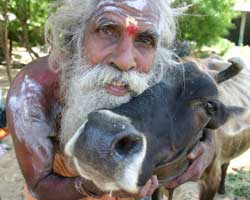 |
People and cows have a close symbiotic relationship in Tamil culture. |
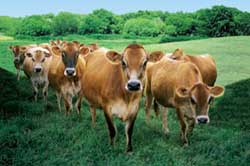 |
Above: Jersey cows |
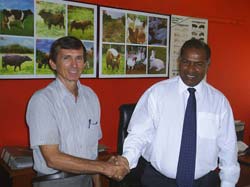 |
Patrick Harrigan and NLDB Chairman A. Wickramanayake met on 5 September 2005. The NLDB Chairman agreed to sell ten hybrid heifers to the Anathi Project. The heifers were finally sold and delivered to five children's homes in Batticaloa District on 3 June 2006. |
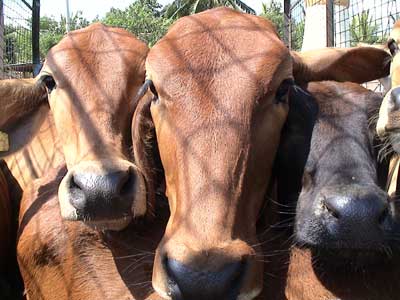 |
|||||||||||||||||||||
Above and below: Year-old Jersey-Sahiwal hybrid heifers begin their journey from Polonnaruwa to orphanages of the East Coast on 3 June 2006. |
|||||||||||||||||||||
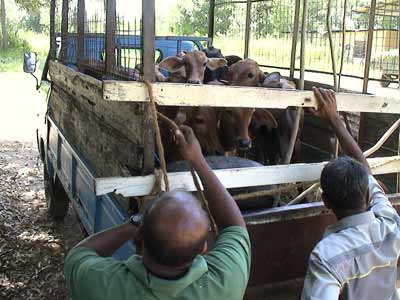 |
|||||||||||||||||||||
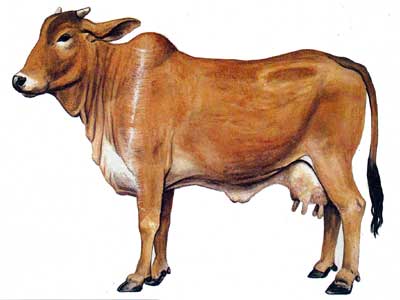 |
|||||||||||||||||||||
Milk cows for this project are cross bred between an Indian Sahiwal cow (above) for resistance to heat and disease, and a Jersey cow for higher production of milk. |
|||||||||||||||||||||
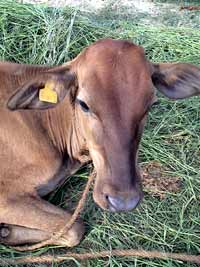 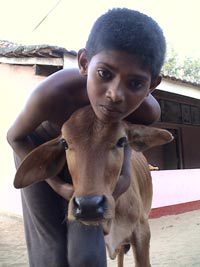 |
|||||||||||||||||||||
Children in five orphanages of in Batticaloa receieved two hybrid heifers each, enough to provide daily fresh milk for 40-50 children. |
|||||||||||||||||||||
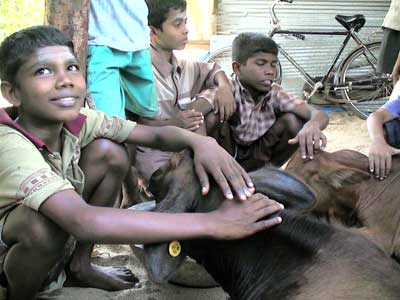 |
|||||||||||||||||||||
Children of Manikkavasagar Boys' Home in Santhively (above) and Swami Vipulananda Boys' Home in Palugamam (below) with the yearling heifers delivered to their homes by project volunteers on 3 June 2006. Two of the four heifers delivered to Swami Vipulananda Boys' Home will provide milk for Sri Kanaga Durgai Amman Girls' Home in Palugamam. From the age of two years the heifers will be capable of producing milk. | |||||||||||||||||||||
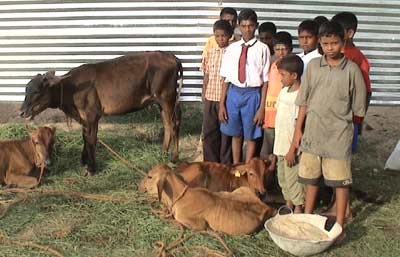 |
|||||||||||||||||||||
Children of Manikkavasagar Boys' Home in Santhively (above) and Swami Vipulananda Boys' Home in Palugamam (below) with the yearling heifers delivered to their homes by project volunteers on 3 June 2006. Two of the four heifers delivered to Swami Vipulananda Boys' Home will provide milk for Sri Kanaga Durgai Amman Girls' Home in Palugamam. From the age of two years the heifers will be capable of producing milk. | |||||||||||||||||||||
| |||||||||||||||||||||
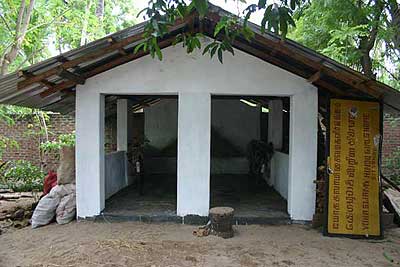 |
|||||||||||||||||||||
Excess project funds are being utilized to build sheds for the heifers, like this one at Sittandy Hindu Girls Home. | |||||||||||||||||||||
'Sponsor a Milk Cow' was an Anathi Project scheme whereby donors abroad sponsored the cost of purchasing and delivering ten Government-bred hybrid Jersey-Sahiwal heifers (young milk cows) to five needy children's home on the east coast of Sri Lanka.
The project began in August 2005 when we realized that donating milk cows would be the best way (indeed, the only way) to ensure that children's homes have a guaranteed sustainable source of fresh milk. We began our research by meeting an old gentleman who had been involved in livestock production since the 1940's. It was he who suggested that we approach the Chairman of the National Livestock Development Board in Colombo to explain our project and request that they sell us pregnant hybrid heifers cross bred between Jersey cows (for milk production) and Indian Sahiwal cows (for resistance to heat and disease).
After first meeting the Batticaloa district Government Agent and obtaining his letter of endorsement, I went to Colombo and met the Chairman of the National Livestock Development Board on 5 September. Mr. Wickramanayake was very sympathetic and, although the NLDB in order to build up its herds was no longer selling these hybrid cows to the public, he offered to make an exception and agreed to sell us up to ten Jersey-Sahiwal heifers "at such time when you are ready to purchase them".
We asked around and found that one liter of milk can serve four or five children. One hybrid cow, therefore, can provide enough milk for twenty to thirty children. Most homes have around 40 or so children, and would require two such cows; in any case caring for two cows is not much more trouble than caring for only one cow.
Cost of sponsoring a Milk Cow
Now, each sponsor wanted to know the cost of sponsoring a cow. This in turn depended upon a number of variables. The cows are sold by the NLDB according to their body weight, and a full grown heifer might weigh around 250 kg on the average, we were told. The cost per kilo is Rs. 100 or about one US dollar. So the cost to us of buying from the NLDB is around US$250 or so. Then we would have to hire a flatbed truck with driver to transport the cows from a NLDB breeding facility and distribute them to the homes here on the east coast.
We estimated that if we are moving ten cows then this would cost us around US$50 or so per cow. Then there are a host of administrative costs and other overhead that we simply could not predict until we had actually done the project for one full cycle.
We therefore called for donors to put up US$400 or 230 UK pounds sterling or 350 euros per cow, which we hoped would cover all associated costs of purchase, delivery, and setup, but would not include recurring costs of monthly fodder, rice bran, or whatever the homes may require to keep the cows healthy and productive. This is part of our understanding with the homes (formalized in a Memorandum of Understanding signed by each home's administrators), that they must accept responsibility for caring for the cows and that our project cannot be responsible for the cows once they have been delivered.
Late 2005
In late September the Anathi Project was advised by NLDB officials that their decision whether to sell hybrid milk cows to Anathi Project would have to be deferred until after Presidential Elections on 17 November. On 5 December Anathi Project Coordinator Patrick Harrigan again visited the National Livestock Development Board in Colombo and met NLDB General Manager M.G. Chandrasena, who accepted Anathi Project's formal written request for hybrid milk cows to be sold to the Anathi Project. Mr. Chandrasena also confirmed the NLDB's earlier assurance that it will release up to ten hybrid cows for sale to the Project, and that the sale and delivery would likely take place in January 2006.
On 19 December Patrick contacted NLDB General Manager Mr. Chandrasena for an update. Mr. Chandrasena informs us that subsequent to the election of a new President of Sri Lanka, the former NLDB Chairman has been replaced by a new Chairman, Mr. Patirajah. Mr. Chandrasena said he would present our request letter of 5 December to the new Chairman and come back to us with the Chairman's response. We are currently anticipating the NLDB's positive response.
Meanwhile, we are not sitting on our hands waiting. In case the NLDB can not deliver on its promise, we are also meeting with local Livestock Development Officers in Batticaloa district, who are quite willing to help us to source hybrid milk cows even locally on the open market if the purchase arrangement with the NLDB does not work out.
As of mid February 2006 we were no longer counting on the NLDB to sell us the cows as promised. In addition to asking local Livestock Development Officers for help in sourceing hybrid cows for sale, we were asking beneficiary children's home administrators to look for suitable hybrid cows for sale in their areas. When they identify cows for sale locally, they would inform us and we would make the purchase and deliver the cows to the homes. This was communicated to the administrators only in mid-February.
April-June 2006: Success!
Finally, in April 2006 Patrick went yet again to meet the General Manager of the NLDB in Colombo to ask for them to definitively tell us if they would sell us the heifers as promised, or not. To our astonishment, the new General Manager Mr. Perera happily agreed to issue a letter at once authorizing the Manager of the NLDB's Polonnaruwa Farm to issue ten heifers on payment.
After obtaining in April from General Manager Mr. Perera the long awaiting letter authorizing the sale of ten hybrid heifers from the National Livestock Development Board's Polonnaruwa Farm, delays ensued in May when it was alleged that cows from the Polonnaruwa Farm were having a condition called Brucellosis, which causes them to have abortions. The Joint Secretary then obtained the NLDB's firm assurance that the Brucellosis outbreak in Polonnaruwa occurred many years ago and had since been eradicated.
With this assurance, Patrick Harrigan and Mr. P. Balachundaram (who also holds a degree in agricultural science) on 3 June 2006 went to the NLDB's Polonnaruwa Farm where they purchased ten Sahiwal-Jersey hybrid heifers averaging 65 kg each, paid Rs. 65,500 and delivered two heifers each to three boys' homes and two girls' homes in Batticaloa District. Each home was required to sign an MOU with the Trust to ensure that they take proper care of the heifers and do not sell them, etc.
Use of excess project funds
Note that the Trust obtained the ten hybrid heifers at far less cost than we had originally anticipated. The project budget raised by subscription from individual donors was approx 10 x Rs. 40,000 = Rs. 4 lakhs. But because the NLDB sold us yearling heifers (weighing ca. 65 kg each) instead of full grown heifers (weighing much more) and because we took delivery from Polonnaruwa instead of from a more distant farm, our direct costs (excluding considerable overheads incurred in administering the project since August 2005) amount to only Rs. 72,580.
We decided that the excess project funds over our costs of purchasing and delivering the cows and administering the project, should be used to help the homes to build cow sheds to protect the heifers especially during the rainy season in November-December. Accordingly, cow sheds have been built at Manikkavasagar Boys Home, Yogaswami Hindu Girls Home, and Swami Natarajananda Boys Home in Sittandy. Funds were advanced for construction in Palugamam, but hostilities on the east coast caused the transport of cement to that area to be prohibited by the authorities, and as of date (7 August 2007) construction there remains suspended.
Report to be continued. More information, contact Project Manager Patrick Harrigan
Hybrid Milk Cow Project: Donors and their Standing Accounts current as of 30 June 2006 |
|||||||
| Donor | Amount | Status | SL Rupees | Heifer | Balance | Children's Home | |
| 1 | Praemini's Kindergarten, Berlin | Rs.11,710 | Paid cash 09.08.2005 | 11,710 | 7258 | 4,452 | |
| 2 | Praemini's Kindergarten, Berlin | €640 | Paid cash 09.08.2005 | 67670 | 7258 | 60,412 | |
| 3 | MOMS Club of Monroe, Beth Mindes | $412.50 | Paid cash 23.12.2005 | 41526 | 7258 | 34,268 | |
| 4 | MOMS Club of Monroe, Beth Mindes | $412.50 | Paid cash 23.12.2005 | 41526 | 7258 | 34,268 | |
| 5 | Carole Kahn of Hawaii | $500 | Paid by check 23.12.2005 | 50334 | 7258 | 43,076 | Yogaswami Hindu Girls Home |
| 6 | Nilufer Clubwala and friends | $300 | Paid by check 23.12.2005 | 30200 | 7258 | 22,942 | Yogaswami Hindu Girls Home |
| 7 | Columbiaville Organic Cooperative | $400 | Paid by check | 40268 | 7258 | 33,010 | |
| 8 | Rudolf-Diesel Realschule Munchen | €330 | Paid cash 09.10.2005 | 39308 | 7258 | 32,050 | Manikkavasagar Boys Home |
| 9 | Katherina Hess of Munich | €350 | Paid cash 9.11.2005 | 41690 | 7258 | 34,432 | Manikkavasagar Boys Home |
| 10 | Sherin Brooks and friends of UK | £300 | Bank transfer 26.04.2006 | 52395 | 7258 | 45,137 | |
| TOTALS | 416,627 | 72580 | 344,047 | ||||
| Living Heritage Trust ©2023 All Rights Reserved |